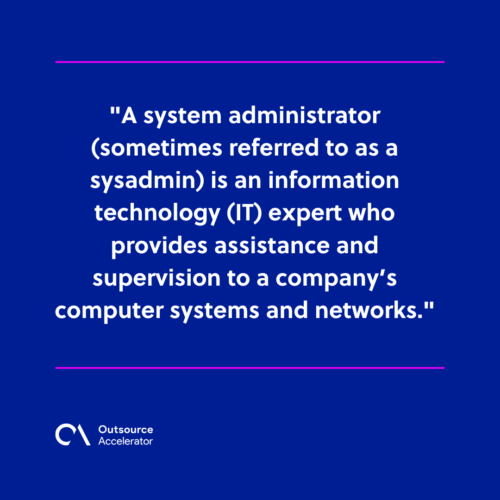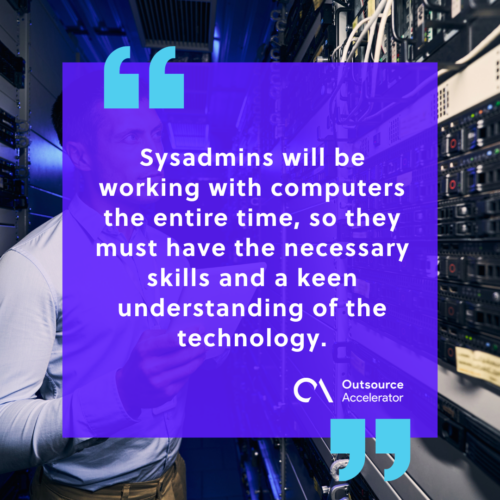System administrator: Roles, skills, and benefits

As companies continue to utilize technology in their everyday lives, the role of the system administrator becomes more and more in demand.
Without them, workplace operations would be totally different and inefficient as they provide the necessary technical expertise to keep our systems running smoothly.
Learn more about this important role in the article below.
What is a system administrator?
A system administrator (sometimes referred to as a sysadmin) is an information technology (IT) expert who provides assistance and supervision to a company’s computer systems and networks.
They are in charge of identifying and troubleshooting technological issues and ensuring optimal performance of a company’s IT system.
Part of this involves monitoring a company’s internet servers and preventing anything that could cause work disruptions.

Roles and responsibilities of a system administrator
The system administrator has a wide range of responsibilities to keep a company up and running.
Technical support
System administrators are the go-to people when it comes to technical support. This may be in the form of attending to customer support tickets or finding the causes of system failures or interruptions.
These are the ideal people for this role as they have the necessary expertise. Sometimes, they even design and monitor the system so only they know how it works.
Managing operating systems
Every computer runs on an operating system, and it is the sysadmin’s job to choose and manage the best one for the employees to accomplish their tasks efficiently.
This includes managing firewalls and preventing cyber threats. Sysadmins also handle the hardware and software and ensure they all function properly.
Monitoring and upgrading systems
Sysadmins monitor systems to ensure they are working at their peak. This includes keeping track of traffic, identifying and responding to potential threats, and ensuring legal and compliant data usage.
Additionally, companies need to stay updated with the latest technologies, and that is something that sysadmins help with as well.
Part of the job is checking if any hardware or software systems are due for an upgrade to prevent companies from lagging on technology.
Managing data, permissions, and security
System administrators monitor and regulate who has access to a certain computer system. They are responsible for managing permissions, logins, and other sign-on policies.
Sysadmins are essential in preventing cyber threats like hackers and data leaks. They handle a company’s cybersecurity measures and implement protocols to ensure data confidentiality.
What to look for in a system administrator
System administrators play a big role in maintaining system and network security and efficiency, and doing so requires a certain set of skills.
System administrator certifications
Sysadmin certifications are not mandatory, but they are helpful in verifying a candidate’s competencies and skills.
Candidates can acquire certifications from the Computing Technology Industry Association (CompTIA), the leading provider of IT certifications. The most popular certifications include:
- CompTIA A+ (Foundational IT skills)
- CompTIA Network+ (Wired and wireless device management)
- CompTIA Security+ (Network security)
Technical expertise
Sysadmins will be working with computers the entire time, so they must have the necessary skills and a keen understanding of the technology.
They must have deep knowledge of various computer systems, local and wide area networks, and other data systems.
Problem-solving skills
Since sysadmins are responsible for solving technical problems, an ideal candidate must have strong problem-solving skills.
This includes having a strong sense of data literacy and identifying server or system issues.

Benefits of hiring a system administrator
Having a system administrator on board is a huge responsibility and can be very beneficial to your business in many ways.
System stability and reliability
Sysadmins are responsible for maintaining the functionality and stability of your computer systems. They monitor servers, networks, and other parts of the infrastructure to ensure they operate smoothly.
You can sit back and do work without any interruptions, as the sysadmin is keeping an eye on the systems at all times.
Robust security measures
As technology continues to rise, so does the number of cyberattacks and threats.
Fortunately, a system administrator helps prevent these issues by implementing robust security measures and ensuring data privacy.
Quick problem resolution
In the event that a disruption occurs, the sysadmin is ready to remedy the situation.
Given their expertise in technology, not only can they solve the problem, but they can do so quickly and without any hassle to you or the company.
Performance optimization
Sysadmins help optimize the performance of any organization’s IT infrastructure. This includes monitoring and maximizing resources, identifying bottlenecks, and improving overall efficiency.
Outsource a system administrator now
System administrators are in high demand, and companies everywhere are looking to outsource the best ones for themselves. It is time for your company to do the same.
Outsourcing a sysadmin is a worthy, long-term investment that brings about several benefits and positive results to your organization, so it would be a waste not to utilize their skills and expertise.







 Independent
Independent




